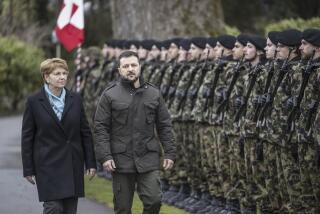Shultz in Geneva, Seeks Summit Agenda Accord
- Share via
GENEVA — With the summit just two weeks away, Secretary of State George P. Shultz flew here Sunday for meetings with Soviet Foreign Minister Eduard A. Shevardnadze to settle still-outstanding issues on a medium-range missile agreement and the entire agenda of summit topics.
“We and the Soviets intend to try to finish it,” Shultz said en route here from Washington for the two-day session. Both the U.S. and Soviet delegations have authority to clear up the few remaining differences, he added.
Both sides want the missile treaty text completed this week, officials said, so that lawyers and technicians can “scrub it” for inconsistencies or errors, translators can agree on identical English and Russian texts and the document can be printed, error-free, in both languages for signing during the Dec. 7-10 meeting in Washington.
Shultz continued to express confidence that the treaty would be ready and the summit would occur as scheduled. “The treaty is virtually completed,” he said. “All the main things are agreed to.”
Shevardnadze, on his arrival here Sunday, said, “We are now at the most crucial stage of the preparations,” and added, “We’ve now come to complete our work.”
Difficult, Sensitive Questions
“Certain difficult questions” continue to exist between the two sides, he said, “questions that are very sensitive” because they affect the territory of the Soviet Union, the United States and third countries. This was an allusion to verification problems, including those that involve inspections in North Atlantic Treaty Organization countries.
Despite these questions, Shevardnadze said, “we expect we will be able to complete our work successfully.”
On some of the regional, or Third World, issues that will come up during the summit, Shultz told reporters traveling with him that the United States would seek further Soviet steps in Afghanistan and the Persian Gulf.
He welcomed statements from Soviet officials that Moscow would consider withdrawing its troops from Afghanistan within a 7- to 12-month period, but he said the Soviets have still not proposed a new government in Kabul that is acceptable to the United States or the Afghan people.
The United States also would like Moscow to join in voting an arms embargo against Iran because Tehran has refused to accept a U.N. Security Council call for a cease-fire in its war with Iraq. “Our view is that it is time to move forward” with sanctions, Shultz said, although Moscow prefers to wait still longer for some Iranian concession.
‘Satisfactory Way’
But the main focus of the meetings with Shevardnadze here will be arms control, particularly the last-minute problems in the missile agreement. “At this point, everything is a detail compared to six weeks ago,” Shultz said. “We’ve got to get the details done in a satisfactory way . . . .
Asked about complaints by former Pentagon arms experts Richard N. Perle and Frank J. Gaffney Jr. that negotiations under deadline pressure are “dangerous,” Shultz said he disagreed about “the usefulness of deadlines. If we had no deadlines, it’s unlikely anything would get done.”
Shultz also expressed optimism that one of the last significant issues in the verification scheme for the missile agreement will be resolved successfully.
U.S. Inspections
This issue arose after the Soviets agreed to allow U.S. inspectors to be stationed at a plant that assembles both the SS-20 medium-range missiles, which will be banned under the treaty, and the SS-25 long-range missiles, which will not be banned.
As a “comparable” facility, the Soviets wanted to send inspectors to the U.S. cruise missile plant in San Diego that produces both ground-launched missiles, which will be banned, and sea-launched missiles, which will not be banned.
But the United States refused. Instead, it will offer inspection of some other U.S. facility, officials said. Shultz declined to specify which facility it will be but said, “We believe we have a method to satisfy them (the Soviets) on this verification issue.”
More to Read
Sign up for Essential California
The most important California stories and recommendations in your inbox every morning.
You may occasionally receive promotional content from the Los Angeles Times.













